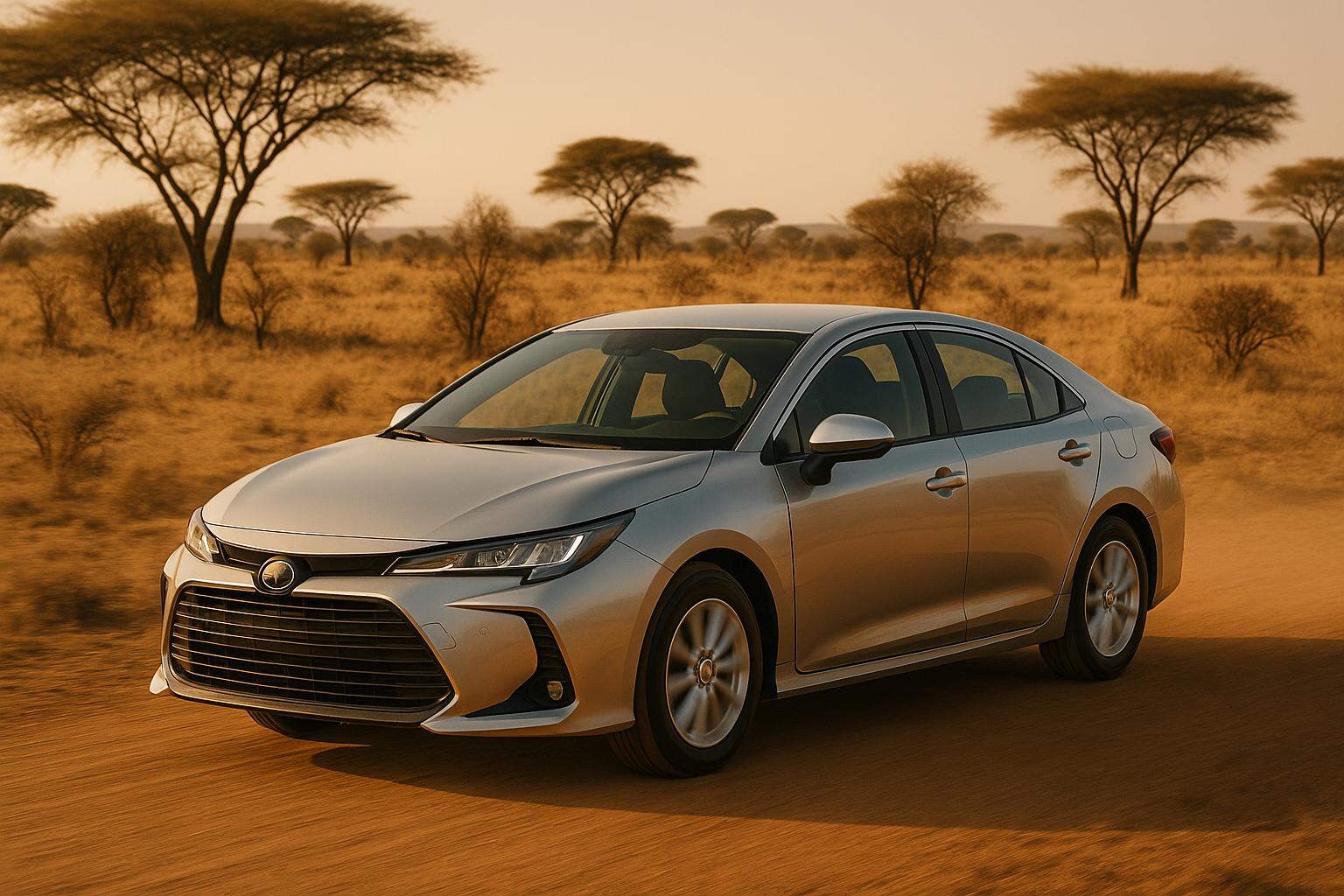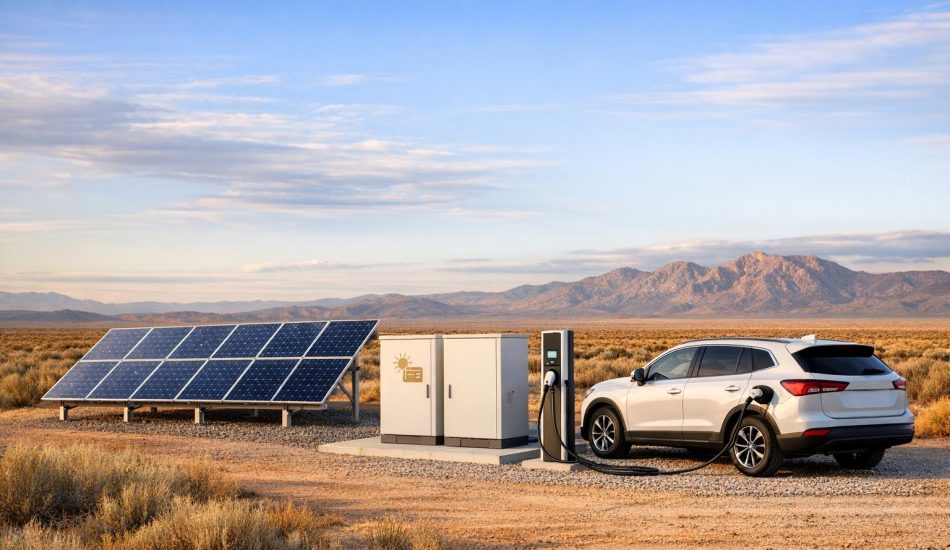
Are hybrid cars a good fit for Africa in 2025? Yes, they address key challenges like unreliable electricity, high fuel costs, and rising emissions. Hybrid Electric Vehicles (HEVs) combine a gasoline engine and electric motor, offering better fuel efficiency and lower emissions without needing charging stations – a practical solution for regions with limited infrastructure.
Key Takeaways:
- Fuel Savings: HEVs use less fuel, with models like the Suzuki Baleno Cross Hybrid achieving 3.8 L/100 km.
- Lower Emissions: HEVs emit 30–50% less CO₂ than traditional vehicles.
- No Charging Needed: They run on fuel and recharge through regenerative braking, bypassing the need for EV charging networks.
- Affordability Issues: HEVs cost $18,000–$28,000, higher than conventional cars but cheaper than electric vehicles (EVs).
- Top Picks: Toyota Yaris Cross Hybrid ($28,947) and Suzuki Baleno Cross Hybrid ($23,684) stand out for urban use.
Despite challenges like high prices, limited service centers, and road conditions, HEVs offer a practical step toward cleaner transportation in Africa while addressing infrastructure constraints.
The Best Hybrid Cars in South Africa Under R550K! | VIABLE ALTERNATIVES
Main Benefits of HEVs for African Markets
These practical advantages make HEVs an appealing solution to Africa’s unique transportation challenges.
Fuel Efficiency and Cost Savings
HEVs pair an electric motor with a gasoline engine to cut down on fuel consumption. For instance, the Haval Jolion hybrid achieves 5.1 L/100 km compared to 7.5 L/100 km for its petrol-only counterpart. Similarly, the Suzuki Baleno Cross Hybrid and Toyota Corolla Cross 1.8 Hybrid XS deliver impressive fuel economies of 3.8 and 4.1 L/100 km, respectively.
For urban drivers with regular commutes, these fuel savings – along with perks like longer brake pad life thanks to regenerative braking – can help offset the higher purchase price of HEVs.
"For many South Africans, a hybrid offers both short-term cost relief and long-term value." – ImotoNews.co.za
Lower Emissions and Cleaner Air
HEVs are designed to use less fuel and emit fewer greenhouse gases compared to traditional vehicles. By combining an internal combustion engine with an electric motor, they reduce fuel consumption and pollution. A full transition to Plug-in Hybrid Electric Vehicles (PHEVs) could cut CO₂ emissions across Africa by as much as 50%. Even standard HEVs make a noticeable environmental difference by producing fewer emissions.
In regions where electricity grids are not particularly clean – an issue in many parts of Africa – HEVs can have a smaller overall environmental footprint than Battery Electric Vehicles (BEVs), especially when considering air quality impacts. Additionally, HEVs contribute to cleaner and quieter urban environments by reducing both air and noise pollution in fast-growing cities.
Works Without Charging Infrastructure
Africa’s limited EV charging infrastructure and unreliable electricity supply make HEVs a practical choice. These vehicles operate using gasoline and regenerative braking, bypassing the need for an extensive charging network. Unlike BEVs, which depend on charging stations, HEVs rely entirely on fuel and their ability to recharge the battery while driving.
As of 2021, Africa had only about 500 EV charging stations listed on the PlugShare app, with 61% of them located in South Africa. Other countries like Ghana, Nigeria, and Uganda each had just three, while Mauritius had six.
Given Sub-Saharan Africa’s low levels of electricity reliability, HEVs take advantage of the well-established fuel infrastructure. This makes them ideal for long-distance travel and rural areas where charging stations are unlikely to be economically viable, ensuring uninterrupted mobility.
Vehicle Type Comparison Table
| Feature | Conventional Vehicles | Hybrid Electric Vehicles (HEVs) | Battery Electric Vehicles (BEVs) |
|---|---|---|---|
| Fuel Economy | 7–12 L/100 km | 3.8–5.2 L/100 km | 0 L/100 km (electricity only) |
| Emissions | High CO₂ and pollutants | 30–50% lower than conventional | Zero tailpipe emissions |
| Upfront Cost | $15,000–$25,000 | $18,000–$28,000 | $35,000–$55,000+ |
| Range | 400–600 miles | 400–600 miles | 150–300 miles |
| Infrastructure Needed | Gas stations only | Gas stations only | Charging networks required |
| Maintenance | Standard complexity | Medium (dual systems) | Low (fewer moving parts) |
| Best Use Case | Budget-conscious buyers | Urban commuters, mixed driving | Urban areas with charging access |
"If you’re looking for lower running costs, reduced emissions, and peace of mind, then yes – a hybrid is worth it in most urban cases." – ImotoNews.co.za
This comparison highlights why HEVs are a practical choice for many African markets. They deliver fuel savings and environmental benefits without requiring the extensive charging infrastructure that BEVs depend on. However, while HEVs offer clear advantages, there are still hurdles to overcome for broader adoption in Africa.
Challenges of HEV Adoption in Africa
While hybrid electric vehicles (HEVs) offer numerous benefits, their adoption across African markets faces several hurdles. Key challenges include high upfront costs, limited service infrastructure, environmental factors, and restrictive import policies. Together, these issues make it difficult to integrate HEVs into a region heavily reliant on traditional fuel systems.
High Costs and Financing Options
One of the biggest obstacles to HEV adoption in Africa is their steep price tag. HEVs in Sub-Saharan Africa are typically 30-70% more expensive than conventional vehicles. For instance, in South Africa, many hybrid models start at over $55,600, putting them out of reach for most buyers. This price gap is driven by factors like Africa’s dependence on imported HEVs, which come with added costs from shipping, tariffs, and supply chain delays. Limited financing options and higher insurance premiums add to the financial burden.
Import taxes also play a significant role in driving up prices. In Tanzania, for example, import taxes would need to drop by at least 40% for hybrid vehicles to match the total cost of ownership of traditional internal combustion engine (ICE) vehicles. A Toyota Corolla hybrid in Tanzania has a 10-year total cost of ownership of $50,022, compared to $48,960 for its petrol-powered equivalent.
Limited Service Centers and Parts
Beyond the high purchase price, HEV owners face challenges with maintenance and repair. Dedicated service centers for HEVs are scarce across Africa, leaving many owners dissatisfied with the availability of support compared to conventional vehicles. HEVs require specialized expertise to handle their high-voltage systems, advanced battery diagnostics, and software updates – skills that go beyond traditional automotive repair training. This shortage of qualified technicians leads to longer repair times and higher maintenance costs.
Climate and Road Conditions
Africa’s climate and infrastructure also pose challenges for HEVs. Extreme temperatures can reduce battery efficiency by as much as 54%, significantly impacting vehicle performance and battery life. Additionally, the continent’s underdeveloped road network – with only 89 kilometers of road per 1,000 square kilometers and fewer than 20% of roads paved – subjects HEVs to constant wear and tear from rough surfaces. Smaller, more aerodynamic vehicles are particularly affected during city driving, while larger HEVs experience reduced range at highway speeds due to factors like heat and speed-related energy demands.
Government Policies and Import Rules
Restrictive government policies and import taxes further complicate HEV adoption. Across much of Africa, import duties on alternative powertrain vehicles, including hybrids, are significantly higher than those for conventional cars. For example, in Ghana, hybrid vehicles face a 20% import tax, while conventional cars are taxed at only 5%. Similarly, in South Africa, import taxes for hybrids are set at 25%, compared to 18% for traditional vehicles. These inconsistent policies create uncertainty for consumers and importers, making it harder to establish HEVs as a viable transportation option across the continent.
sbb-itb-99e19e3
Best HEV Models for African Roads
Navigating Africa’s diverse and often challenging driving conditions requires vehicles that are both efficient and built to last. Hybrid electric vehicles (HEVs) are stepping up to meet these demands, offering a mix of durability, fuel efficiency, and environmental benefits. Below are some of the top HEVs that have proven their worth on African roads.
Top-Selling HEVs for Africa
Toyota continues to dominate the hybrid market in Africa, thanks to its reliable self-charging hybrid technology. The Toyota Yaris Cross Hybrid, priced at around $28,947, is a compact SUV ideal for urban driving and small families. It boasts an impressive fuel economy of 4.3L/100km, Toyota Safety Sense features, and a sleek infotainment system. Plus, Toyota’s hybrid models emit up to 70% fewer smog-forming emissions compared to conventional gas engines, making them a greener choice.
Another standout option is the Toyota Corolla Cross Hybrid, slightly more affordable at $28,700. It shares Toyota’s hallmark dependability and is well-suited for a variety of drivers. For those who prefer sedans, the Toyota Corolla Hybrid ($30,615) and Toyota Corolla Hatch Hybrid ($31,931) offer the same hybrid technology in different styles. Meanwhile, the Toyota RAV4 Hybrid, priced at $45,184, provides more space and versatility, making it perfect for families or those needing a robust SUV.
Suzuki presents a budget-friendly choice with its Baleno Cross Hybrid, priced at about $23,684. This lightweight vehicle excels in fuel efficiency, achieving an impressive 3.8L/100km. It’s a great pick for drivers focused on affordability and economy. While Suzuki’s service network isn’t as extensive as Toyota’s, its reputation in the second-hand market is steadily improving.
Honda brings a touch of luxury to the hybrid market with the HR-V e:HEV, priced at $31,579. This model features a dual-motor hybrid system, a refined interior, and a sturdy build for a smooth and comfortable ride. Although its fuel economy is slightly less efficient at 5.0L/100km, it compensates with premium finishes and a seamless driving experience.
BYD introduces cutting-edge technology with the Dolphin Plug-in Hybrid, priced at $34,210. It offers an electric-only range of 60km and an outstanding hybrid fuel economy of just 1.0L/100km. With features like regenerative braking and a modern interior, it promises lower maintenance costs and a futuristic driving experience. However, BYD’s service network is still limited outside major cities.
Emerging players are also making their mark. Nissan is expanding its presence in Africa with its e-Power hybrid technology. After successful launches in countries like Morocco, Egypt, and Tunisia, Nissan is considering introducing the X-Trail e-Power to more markets. Ramy Mohareb, head of communications for Nissan Africa, highlights the technology’s suitability for the continent:
"Why we’re saying it fits Africa, is because you don’t need the extensive infrastructure, and battery cost is not as high as the current EVs. There is no range anxiety. So we think that this is the right technology to transition to full EVs in Africa."
HEV Model Comparison Table
| Model | Price (USD) | Fuel Economy (L/100km) | Key Highlights | EV24.africa Availability |
|---|---|---|---|---|
| Suzuki Baleno Cross Hybrid | ~$23,684 | 3.8 | Affordable, lightweight, ideal for budget-conscious buyers | Yes |
| Toyota Yaris Cross Hybrid | ~$28,947 | 4.3 | Durable, urban-friendly, great resale value | Yes |
| Toyota Corolla Cross Hybrid | ~$28,700 | N/A | Reliable, self-charging, strong service network | Yes |
| Toyota Corolla Hybrid | ~$30,615 | N/A | Sedan option, proven hybrid tech, excellent resale value | Yes |
| Honda HR-V e:HEV | ~$31,579 | 5.0 | Premium comfort, dual-motor system, refined interior | Yes |
| Toyota Corolla Hatch Hybrid | ~$31,931 | N/A | Compact versatility, Toyota’s trusted hybrid tech | Yes |
| BYD Dolphin Plug-in Hybrid | ~$34,210 | 1.0 | 60km EV range, modern features, regenerative braking | Yes |
| Toyota RAV4 Hybrid | ~$45,184 | N/A | Spacious SUV, Toyota reliability, high-end hybrid option | Yes |
Conclusion: Is Africa Ready for HEVs in 2025?
Africa’s journey toward adopting hybrid electric vehicles (HEVs) is a complex one, shaped by economic realities and infrastructure challenges. While readiness varies across the continent, HEVs offer a practical solution for balancing growing vehicle demand – expected to double by 2050 – with limited charging infrastructure and grid reliability. The market is projected to hit $25.40 billion by 2030, growing at an annual rate of 10.20%.
Who Should Buy HEVs?
Given these challenges and opportunities, certain groups are better positioned to benefit from HEVs.
Urban commuters in cities like Lagos, Nairobi, and Cape Town are prime candidates. HEVs thrive in stop-and-go traffic by leveraging features like regenerative braking and electric assist, which optimize fuel efficiency. Models such as the Toyota Yaris Cross Hybrid stand out as fuel costs rise, making them a smart choice for city dwellers.
Commercial fleet operators can also see long-term savings with HEVs, thanks to their lower total cost of ownership. However, for those who plan to sell their vehicles within three years, the higher upfront cost may outweigh the fuel savings.
Government and corporate buyers, particularly in countries like Rwanda, benefit from policy incentives like reduced import duties. Rwanda’s hilly terrain also highlights the advantage of HEVs’ strong electric motor torque, making them a practical option for the region.
When purchasing an HEV, buyers should prioritize vehicles with solid battery warranties (typically 5–8 years) from trusted brands like Toyota and Honda. Exploring insurance discounts for eco-friendly vehicles can further reduce costs.
Advice for Buyers and Policymakers
For individual buyers, understanding driving habits is key. HEVs perform exceptionally well in urban environments, though their fuel-saving advantages may diminish on highway-heavy routes. Additionally, choosing a brand with a robust service network – such as Toyota, which has an established presence across Africa – can ensure long-term reliability.
Policymakers play a vital role in accelerating HEV adoption. Rwanda’s success in generating over half its electricity from renewable sources illustrates how supportive policies can drive change. Introducing regulations for used vehicle imports, setting fuel efficiency standards, and forming partnerships with countries like India – known for their advanced EV ecosystems – can pave the way for technology transfer and knowledge sharing.
Main Takeaways
The path to HEV adoption in Africa is uneven. Countries like South Africa and Morocco, often considered "Emulators", benefit from better infrastructure, while "Innovators" such as Kenya and Rwanda are creating localized solutions. Meanwhile, many nations remain "Stragglers", struggling with limited readiness.
Affordability remains a significant hurdle. With 76% of African countries having motorization rates below 100 vehicles per 1,000 people – far below the global average of 300 – addressing poverty is key to making HEVs accessible.
Despite these challenges, HEVs offer immediate advantages: reduced fuel consumption, lower emissions, and cleaner urban air – all without requiring extensive infrastructure upgrades. For buyers whose needs and budgets align, HEVs present a practical option that supports both economic and environmental goals.
As urbanization, policy shifts, and environmental awareness reshape Africa’s automotive landscape, HEVs can deliver real benefits now, even as the continent works toward broader electric vehicle adoption.
FAQs
What challenges do hybrid cars face in Africa, and how can they be addressed?
Hybrid electric vehicles (HEVs) in Africa face several hurdles that hinder their widespread adoption. Among the most pressing issues are limited access to charging infrastructure, an unreliable electricity supply, high initial costs, and a general lack of supportive government policies. These barriers make it challenging for HEVs to gain traction across the continent.
Addressing these obstacles requires a multi-faceted approach. Solutions like developing solar-powered charging stations, encouraging local manufacturing to bring down costs, and introducing favorable government policies can pave the way for progress. These steps could improve affordability, expand infrastructure, and create a more supportive environment for HEVs in Africa.
How do hybrid cars compare to traditional gas-powered vehicles and fully electric cars in terms of cost, emissions, and practicality for Africa?
Hybrid electric vehicles (HEVs) strike a balance between traditional gas-powered cars and fully electric vehicles (BEVs), offering a practical solution for Africa. With lower upfront costs compared to BEVs and minimal reliance on charging infrastructure – which remains limited in many parts of the region – HEVs present a more accessible alternative. They also deliver improved fuel efficiency and produce fewer emissions than conventional vehicles, making them a cleaner choice for the environment.
Although BEVs eliminate tailpipe emissions entirely, their higher cost and dependence on a reliable charging network can make them less feasible in Africa. In contrast, HEVs align well with the continent’s existing infrastructure and fuel resources, providing an affordable and realistic pathway toward more sustainable transportation.
What are the best hybrid cars for African roads in 2025 and why?
The Toyota Yaris Cross Hybrid, Honda HR-V e:HEV, and Suzuki Baleno Cross Hybrid are some of the best hybrid cars suited for African roads in 2025. These vehicles are known for their cost-effectiveness, fuel economy, and dependability, making them ideal for regions where charging stations might be scarce.
Built to withstand Africa’s varied landscapes and weather conditions, these hybrids blend tough construction with reduced operating costs. They offer a practical option for drivers looking for environmentally friendly and budget-conscious transportation.




